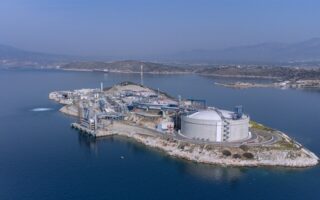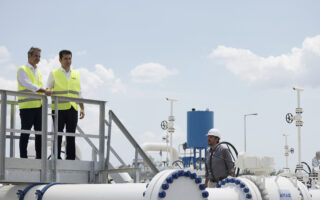Key agreements for energy autonomy
Greece, Bulgaria sign memoranda that will have a significant impact on a European level

Two significant agreements between Greece and Bulgaria, which, according to government sources, “further deepen the strategic energy cooperation between the two countries on the basis of solidarity and reciprocity,” were signed on Thursday in Athens by the two countries’ energy ministers in the presence of Prime Minister Kyriakos Mitsotakis and Bulgarian President Rumen Radev.
The first concerns energy cooperation in gas supply and storage and the second explores the possibility of constructing a new oil pipeline linking the ports of Alexandroupoli and Burgas.
Mitsotakis said the agreements “seal our energy cooperation, while representing another step toward the strategic goal of European autonomy. “Their importance, therefore, goes beyond bilateral borders and I believe that it becomes a political event that concerns the whole of Europe and at the same time establishes solidarity between its countries,” he noted, adding that from now on, Greek companies will be able to store natural gas at the Chiren facility in northwest Bulgaria, while Bulgarian companies will be able to use Revithoussa accordingly. Both countries will thus have guaranteed access to critical infrastructure for their energy security.
As regards oil and freedom from Russian sources, Mitsotakis expressed Greece’s commitment to exploring the possibility of building a new oil pipeline linking the two key ports of Alexandroupoli and Burgas, and through them two seas, the Aegean and the Black Sea.
According to Mitsotakis, the project is being relaunched as the Alexandroupoli-Burgas pipeline, providing Bulgaria with alternative supply sources as well as a safer, quicker, and less expensive method of carrying fuel. In addition to replacing the tankers that have to transit the Bosporus Strait, he pointed out that the pipeline will be added to other energy facilities that are already operational or being built, such as the IGB gas pipeline from Greece to Bulgaria and the floating storage and regasification unit (FSRU) at Alexandroupoli.
For his part, the Bulgarian president said the deals move beyond the dimensions of a cross-border agreement as Greece and Bulgaria have proven to be pillars of stability in the region.
“This cooperation changes the map in Southeastern Europe, opening up new perspectives for both countries,” he said.





